What can we learn from Elijah? #5 God sometimes speaks in whispers, not shouts

The life of Elijah is made up of great peaks and troughs. After his triumph on Mount Carmel he runs for his life to Mount Sinai (1 Kings 19:1-18). There's an earthquake, but God isn't in the earthquake; a wind, but he's not there either; and neither is he in the fire. But when Elijah hears a gentle whisper, he goes to the mouth of his cave; and it's there that he meets him, and God gives him another task.
I wonder whether we today are so busy expecting to meet God on our terms, that we don't meet him at all. Surely God ought to be in the earthquake, wind or fire. And of course, he may be: he may be in the soaring rhetoric of a fine preacher, or the amplified drums and guitars of a mainstage worship band at a huge Christian convention. But we're foolish if we imagine that that's the only place he'll be, and approach every service hoping for another spiritual earthquake.
And surely God ought to be concerned with our needs: our disappointments, our fears, our exhaustion, our sense of being alone? Elijah thought so. He'd been through a lot because he was faithful; so, didn't God owe him something? No: the gentle whisper just gave him more work to do.
And perhaps that's the greatest danger of all: than we're so taken up with the quest for spiritual satisfaction for ourselves that we miss what God is telling us to do for him. JS Mill was an atheist philosopher, but he said something wise: if you seek happiness for yourself, you won't find it. You find it through giving yourself to someone or something else. Sometimes God doesn't give us what we want; he gives us what we need.











